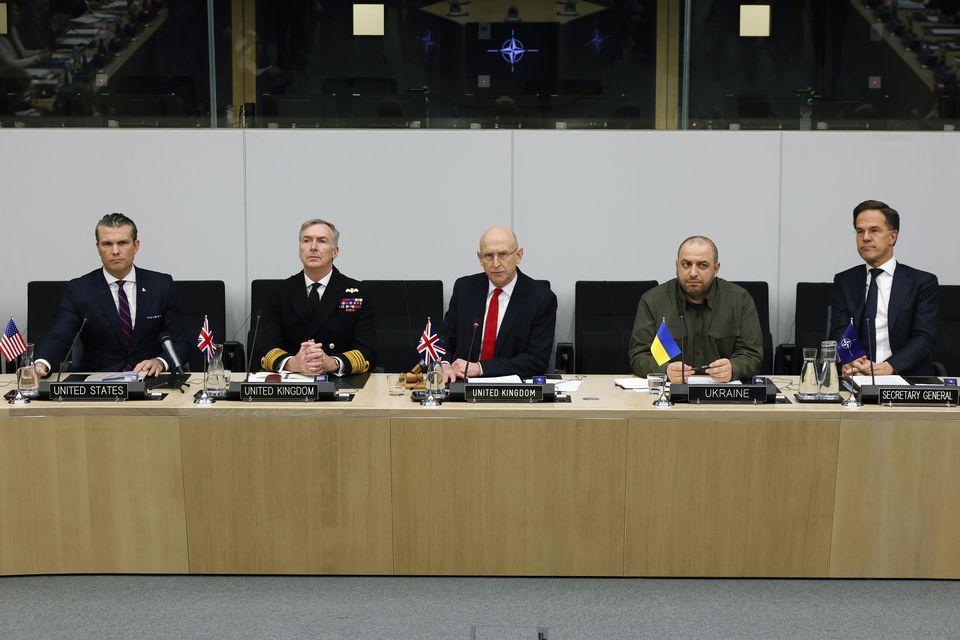US defence secretary Pete Hegseth has said Nato membership for Ukraine is an unrealistic prospect.
He suggested that the way forward for Ukraine was for the country to abandon hopes of a return to its pre-2014 borders and prepare for a negotiated settlement with Russia — one that should be backed up with an international force of troops.
Mr Hegseth made the comments in Brussels during the first trip to Nato and the Ukraine Defence Contact Group by a member of the new Trump administration.
We need your consent to load this Social Media content. We use a number of different Social Media outlets to manage extra content that can set cookies on your device and collect data about your activity.
Allies have been waiting to hear how much continued military and financial support Washington intends to provide to Ukraine’s government.
What they heard was that US President Donald Trump is intent on getting Europe to assume the majority of the financial and military responsibilities for the defence of Ukraine — to include a possible peacekeeping force that would not include US troops — and one that Mr Hegseth said should not have Article Five protections if those troops should end up in contact with Russian forces.
“Members of this contact group must meet the moment,” Mr Hegseth said to the assembled group of approximately 50 member countries who have been providing support to Ukraine since Russia’s 2022 invasion.
US Secretary of Defence Pete Hegseth alongside Admiral Sir Tony Radakin and Defence Secretary John Healey as well as Ukraine’s Defence Minister Rustem Umerov, and Nato Secretary-General Mark Rutte (AP)
Mr Hegseth said that Ukraine’s Western backers must abandon the “illusionary goal” of returning the country to its pre-2014 borders, before Russia annexed the Crimean Peninsula and seized parts of eastern Ukraine.
UK Defence Secretary John Healey said: “We hear you,” in response to Mr Hegseth’s opening remarks.
Both Mr Hegseth and Mr Healey spoke in front of the press at the top of what would be a closed-door session in Brussels to discuss future aid to Ukraine.
Over nearly three years, around 50 countries have collectively provided Ukraine more than 126 billion dollars (£101 billion) in weapons and military assistance.
But the meeting this week was convened by another country for the first time: the UK. All previous gatherings of the forum were chaired by the United States.
No decision has been made on who might chair the next meeting, if one is called.
Mr Hegseth was not expected to make any announcement on new weapons for Ukraine.
We need your consent to load this Social Media content. We use a number of different Social Media outlets to manage extra content that can set cookies on your device and collect data about your activity.
His trip comes less than two weeks before the third anniversary of Russia’s full-scale invasion of Ukraine on February 24 2022.
Most US allies fear that Russian President Vladimir Putin will not stop at Ukraine’s borders if he wins, and that Europe’s biggest land war in decades poses an existential threat to their security.
US President Donald Trump has promised to quickly end the war. He has complained that it is costing American taxpayers too much money. He has suggested that Ukraine should pay for US support with access to its rare earth minerals, energy and other resources.
Mr Hegseth in his remarks said that Nato member nations also need to significantly increase defence spending to 5% of their budgets — a high mark that the US does not presently meet either.
“The United States will no longer tolerate an imbalanced relationship which encourages dependence, rather our relationship will prioritize empowering Europe to own responsibility for its own security,” Mr Hegseth said.
We need your consent to load this Social Media content. We use a number of different Social Media outlets to manage extra content that can set cookies on your device and collect data about your activity.
Some US allies worry that a hasty deal might be clinched on terms that are not favourable to Ukraine.
On top of that, Mr Trump appears to believe that European countries should take responsibility for Ukraine’s security going forward.
Nato is founded on the principle that an attack on any ally must be considered an attack on them all and met with a collective response. Membership is considered to be the ultimate security guarantee, and it is one that Ukraine is trying to secure.
Ukraine’s security needs and defence spending will be discussed on Thursday. European allies have hiked their military budgets since Putin ordered his troops into Ukraine, and 23 are estimated to have reached or exceeded last year the target of spending 2% of gross domestic product.
However, a third of members still have not reached that threshold, and Mr Trump is almost certain to target them again. Recently, Trump called for NATO members to increase defence spending to 5% of GDP, a level that no member has reached so far — not even Poland, which is the closest, spending more than 4% and expected to approach 5% this year.
